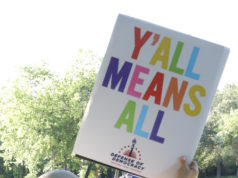The Fort Worth City Council, facing a budget gap of $59 million that it closed by firing long-time workers and forcing pay cuts on those it kept along with cutting millions from various city services, many of which benefited low- to moderate-income residents, has, in its infinite wisdom, voted to spend $50,000 to get $178,413 from a federally-funded nonprofit housing corporation that has no money. The Near Southeast Community Development Corporation’s woes with the city are featured in this week’s cover story, “Broken Down and Getting Back Up.”
As reported in the story, the money was paid to the NSCDC for administrative costs in the planning stages of the Evans and Rosedale Business and Cultural District redevelopment project four years ago from federal funds that were later disallowed by government auditors with the U. S. Department of Housing and Urban Development. Recently fired housing department head Jerome Walker approved the use of the money, and then failed to document it properly, according to government documents and interviews with former city employees. When the auditors couldn’t find justification for the funds in Walker’s records the feds told the city the money had to be paid back “out of non-federal funds” which means local tax dollars.
The Near Southeast CDC, however, was just one of many nonprofit recipients of federal dollars that the agency found questionable. Yet it is the only one that the city has chosen to sue in spite of the fact that the disallowed funds of the other groups totals more than one million dollars which the city must also pay back or risk losing future federal funding.
City Manager Dale Fisseler denied that the NSCDC is being singled out for selective prosecution as its executive director, Shirley Lewis, charges in this week’s story: “We had no choice but to sue. …the largest expenditures of all the CDCs [targeted by the auditors] were [the Near Southeast’s]” he said.
The HUD audits, however, clearly show otherwise.
The Victory Arts apartments on Hemphill, whose developer went bankrupt before the apartments were completed, left the city with a debt of $287,000 for infrastructure costs paid out of federal funds and the Texas Housing and Economic Resources, a non-profit CDC, whose 200-unit housing development project in Rolling Hills went belly-up after only three houses were built, put the city’s liability with the feds at $273,500, also for infrastructure. .
The city has paid back $67,000 of misused funds by the Carver Heights CDC and $47,000 that was disallowed for a Women’s Second Chance project. Other funds disallowed by the auditors were used for services that ranged from after-school programs to housing for AIDS victims.
And then there was the Mexican-themed Mercado Market project on the Near North Side whose misused funds are included in a separate audit. In 1997 the city invested $7 million of federal funds into the project with a HUD requirement that it must produce 109 jobs. Mid-stream the developer went broke, walked off and the city took over the construction. Later the city sold the Mercado for about half of its investment and even though the project is done, no new jobs have been created. It’s been over ten years and HUD wants to see those jobs or it wants its money back.
Additionally, the HUD report found that the housing department “did not maintain accurate records to support the use of [other] funds in the Evans/Rosedale development” project unrelated to the Near Southeast’s problems. It seems Walker approved the use of federal funds to purchase five properties outside the boundaries of the project, requiring the city to repay the government $226,050.
Fisseler, who is known for his accessibility and candidness with the media, wouldn’t talk further about the city decision to sue one but not all of the nonprofits, citing the pending lawsuit. That left the obvious question unanswered: If the purpose of the city is to get those improperly used funds back into the city coffers, why sue only one for a mere $178,000 and not sue them all in order to recover more than a million dollars in funds the city owes the feds?
There are obviously still more questions than answers in this mystifying tale. Stay tuned.











